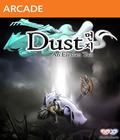This year's Summer of Arcade promotion hasn't quite lived up to the reputation of past years, but at least it's going out with a bang. The annual promotion wrapped up with the release of Dust: An Elysian Tail, which is easily the best selection of the five featured titles.
Designed by Dean Dodrill, Dust is about as close to a "one-man" project as you can get. Dodrill hired out the audio work and voice acting and got publishing assistance from Microsoft, but the core of the game was programmed solely by Dodrill. This includes everything from the silky-smooth 60 frames-per-second animation to the varied quests and hyper-kinetic combat system. Dust is a labor of love, and it shows.
You play as the title character in Dust. Waking up in the forest, you have no memory of your past. Dust's only companions are a talking sword named Ahrah and Fidget, the sarcastic (yet loyal) support character. The trio makes for an interesting bunch, with Ahrah being the wizened serious one, Dust the man of action and Fidget the comic relief. Of the three, Fidget is the most memorable, thanks to a snappy script that isn't afraid to break the fourth wall from time to time and excellent voice acting that gives the little flying furball some depth. If she weren't starring in Dust, Fidget could easily be a sidekick in any number of Disney films.
The film-like visual quality extends throughout the entirety of the game, with the handcrafted 2-D sprites looking like they were pulled directly from a cartoon short or anime film. You haven't seen 2-D graphics like this since the Sega Saturn days. It's a refreshing reminder that not everything in gaming has to be rendered in polygons.
Wandering through the world, the sharp visuals also serve as a call out to areas that are best explored later. Like many games of the genre, Dust doesn't give you a full set of abilities right at the start. Instead, it doles them out as you progress through the game. Some areas that are initially inaccessible will open up after you've earned the corresponding skill. These gated areas are all secondary to the main story line, but they're still worth checking out for the hidden goodies.
Searching for loot is an enjoyable component of Dust, though it sometimes feels more superficial than integral. You'll find random items hidden in treasure chests as well as dropped when enemies are killed. Blueprints can also be found, allowing you to craft new items so long as you can collect the proper components. Unfortunately, this aspect is less engaging than it otherwise could have been due to the way the in-game shop works. Once you sell an item to the shop, it will be permanently cataloged and automatically restocked. As a result, nothing is really rare in the game. So long as you find one of something, the shop will provide the rest.
Interestingly enough, the most enjoyable hidden items aren't loot in the traditional sense, but rather friends. The developer has teamed up with other independent video game creators to include their characters in Dust as prisoners. Each one you find and rescue adds a permanent five percent bonus to your overall health. Some of these characters are hidden within the regular levels, while others are in environments specifically designed to mimic their host games. For example, when Dust goes to rescue the Kid from Bastion, the ground in that area floats up to your feet. It's a nice touch.
Combat in Dust is easy to pick up, but it is also the game's weakest point. This isn't because the combat system is broken; it works well enough. The issue is simply that it doesn't have a whole lot of depth. You learn most of Dust's moves very quickly and, along with them, a basic set of combos. While it's possible to combine a number of attacks into some high-scoring chains, the individual moves are pretty limited.
You have to wait a little longer to learn all three of Fidget's support attacks, though even those appear to differ only in the visuals. There is one (small) puzzle late in the game that requires use of a specific Fidget attack, but aside from that, they are completely interchangeable. Once you've powered up Fidget, most players will likely just spam her attack across the screen. Requiring different attacks for different types of opponents would have made the combat more interesting.
Rounding out the package are challenge arenas. Meant to test your dexterity more than anything else, the challenge arenas have you racing against time. Surviving one rewards you with an item for Dust. Mastering them all nets you an achievement.
An obvious labor of love, Dust: An Elysian Tail more than earns its asking price of 1,200 MSP ($15 USD) through a mix of strong characters and solid gameplay. It's wholly old-school, and we wouldn't have it any other way.
Score: 8.5/10
More articles about Dust: An Elysian Tail











 Dust: An Elysian Tail is a 2D side-scrolling action role-playing video game.
Dust: An Elysian Tail is a 2D side-scrolling action role-playing video game.



